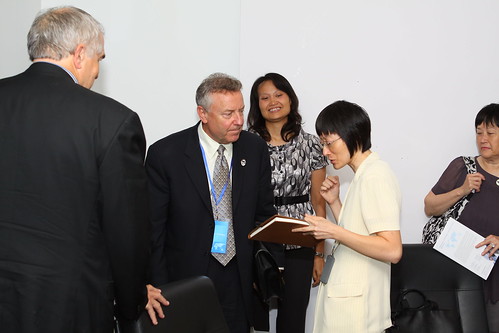
Image : http://www.flickr.com
In many African societies, infants born with defects or atypical features, or those born in ways that are considered strange, are treated as sacred and can be allotted names that relate to supernaturalism. Albinos and those who are crippled are among the ones that fall in this special class. But in the past, most the of atypically born and biologically abnormal babies were traditionally not pleasantly welcomed.
The Nandi (of Kenya) situation (Hollis 1969: 68) largely refers to the distant past.
"Children are buried alive in cow-dung if they cry in...mother's womb, or if at birth they present...legs first, or are born with teeth...events...considered unlucky. Rich people, however, often pay a medicine man a large sum to avert the misfortune and save their children's lives. Children...blind or badly deformed, and illegitimate children, i.e. the offspring of unmarried girls, are likewise made away with at birth."
The Baganda of Uganda traditionally give the name Nnambi ( f ) or Mukasa (m) to one born with two umbilical cords. Nnambi is also traditionally the name of the originating woman, while Mukasa is the name of a highly esteemed God. One who is born alongside a premature and stillborn twin (called mulongo by the royals) is called Nnakimu 'one.' In the past, there was superstition based consternation over the birth of such a child, this infant greatly feared. The name Nnakimu is also given to one born with a harelip, and to one who turns out to be the last-born. The names Kiwanuka (m) 'that which comes down' and Nnaabawanuka ( f ) 'the one of those that come down' are traditionally given to children with noticeable birthmarks. The birthmarks are said to have been effected by Kiwanuka the God of lightning and thunder, while the child was in the womb. These names are also often given to children born when the mother still often carried the preceding sibling of the newborn. The names Bitalo (m), Nabitalo ( f ), and Magero (m) signify amazement. They tend to be given to children born with anomalous features such as visible teeth, and more or less than the normal number of fingers. Such names are also given to children born to mothers whose ages are considerably advanced, relative to the average ages at which women bear children.
References
Hollis, A. C. The Nandi: Their Language and Folk-lore. Oxford, England: Clarendon Press, 1969.
Musere, Jonathan. African Names and Naming. Los Angeles, CA: Ariko Publications, 2000.
Jonathan Musere
No comments:
Post a Comment